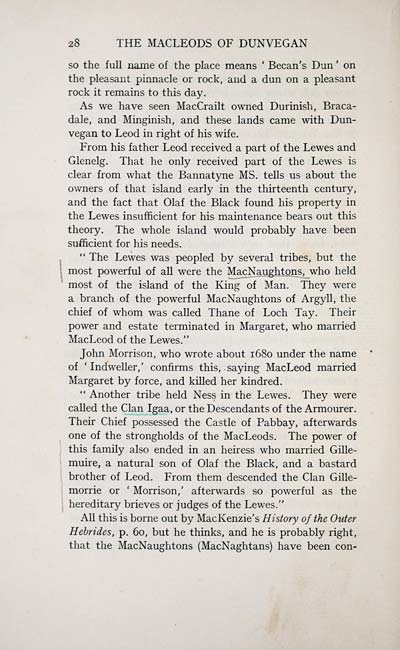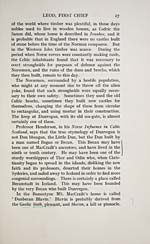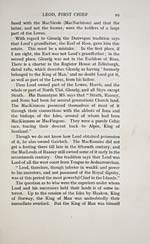Matheson Collection > Macleods of Dunvegan from the time of Leod to the end of the seventeenth century
(60)
Download files
Complete book:
Individual page:
Thumbnail gallery: Grid view | List view

28 THE MACLEODS OF DUNVEGAN
so the full name of the place means ' Becan's Dun ' on
the pleasant pinnacle or rock, and a dun on a pleasant
rock it remains to this day.
As we have seen MacCrailt owned Durinish, Braca-
dale, and Minginish, and these lands came with Dun-
vegan to Leod in right of his wife.
From his father Leod received a part of the Lewes and
Glenelg. That he only received part of the Lewes is
clear from what the Bannatyne MS. tells us about the
owners of that island early in the thirteenth century,
and the fact that Olaf the Black found his property in
the Lewes insufficient for his maintenance bears out this
theory. The whole island would probably have been
sufficient for his needs.
" The Lewes was peopled by several tribes, but the
most powerful of all were the MacNaughtons, who held
most of the island of the King of Man. They were
a branch of the powerful MacNaughtons of Argyll, the
chief of whom was called Thane of Loch Tay. Their
power and estate terminated in Margaret, who married
MacLeod of the Lewes."
John Morrison, who wrote about 1680 under the name
of ' Indweller,' confirms this, saying MacLeod married
Margaret by force, and killed her kindred.
" Another tribe held Ness in the Lewes. They were
called the Clan Igaa, or the Descendants of the Armourer.
Their Chief possessed the Castle of Pabbay, afterwards
one of the strongholds of the MacLeods. The power of
this family also ended in an heiress who married Gille-
muire, a natural son of Olaf the Black, and a bastard
brother of Leod. From them descended the Clan Gille-
morrie or ' Morrison,' afterwards so powerful as the
hereditary brieves or judges of the Lewes."
All this is borne out by MacKenzie's History of the Outer
Hebrides, p. 60, but he thinks, and he is probably right,
that the MacNaughtons (MacNaghtans) have been con-
so the full name of the place means ' Becan's Dun ' on
the pleasant pinnacle or rock, and a dun on a pleasant
rock it remains to this day.
As we have seen MacCrailt owned Durinish, Braca-
dale, and Minginish, and these lands came with Dun-
vegan to Leod in right of his wife.
From his father Leod received a part of the Lewes and
Glenelg. That he only received part of the Lewes is
clear from what the Bannatyne MS. tells us about the
owners of that island early in the thirteenth century,
and the fact that Olaf the Black found his property in
the Lewes insufficient for his maintenance bears out this
theory. The whole island would probably have been
sufficient for his needs.
" The Lewes was peopled by several tribes, but the
most powerful of all were the MacNaughtons, who held
most of the island of the King of Man. They were
a branch of the powerful MacNaughtons of Argyll, the
chief of whom was called Thane of Loch Tay. Their
power and estate terminated in Margaret, who married
MacLeod of the Lewes."
John Morrison, who wrote about 1680 under the name
of ' Indweller,' confirms this, saying MacLeod married
Margaret by force, and killed her kindred.
" Another tribe held Ness in the Lewes. They were
called the Clan Igaa, or the Descendants of the Armourer.
Their Chief possessed the Castle of Pabbay, afterwards
one of the strongholds of the MacLeods. The power of
this family also ended in an heiress who married Gille-
muire, a natural son of Olaf the Black, and a bastard
brother of Leod. From them descended the Clan Gille-
morrie or ' Morrison,' afterwards so powerful as the
hereditary brieves or judges of the Lewes."
All this is borne out by MacKenzie's History of the Outer
Hebrides, p. 60, but he thinks, and he is probably right,
that the MacNaughtons (MacNaghtans) have been con-
Set display mode to: Large image | Transcription
Images and transcriptions on this page, including medium image downloads, may be used under the Creative Commons Attribution 4.0 International Licence unless otherwise stated. ![]()
| Early Gaelic Book Collections > Matheson Collection > Macleods of Dunvegan from the time of Leod to the end of the seventeenth century > (60) |
|---|
| Permanent URL | https://digital.nls.uk/80472522 |
|---|
| Description | Items from a collection of 170 volumes relating to Gaelic matters. Mainly philological works in the Celtic and some non-Celtic languages. Some books extensively annotated by Angus Matheson, the first Professor of Celtic at Glasgow University. |
|---|
| Description | Selected items from five 'Special and Named Printed Collections'. Includes books in Gaelic and other Celtic languages, works about the Gaels, their languages, literature, culture and history. |
|---|

